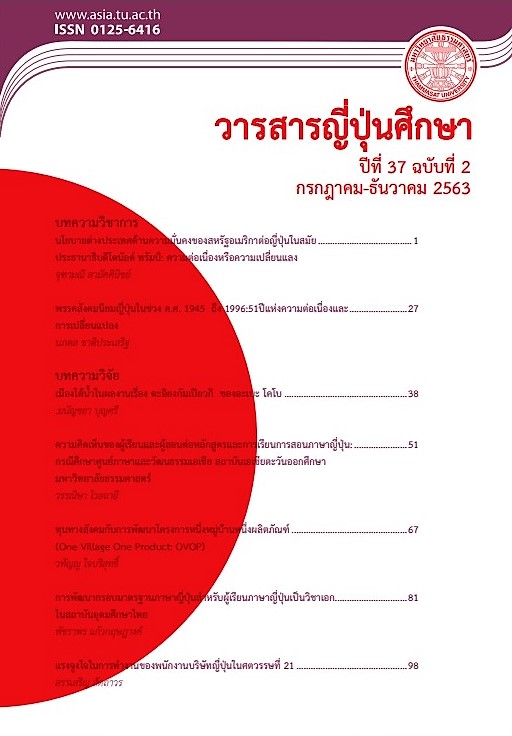แรงจูงใจในการทำงานของพนักงานบริษัทญี่ปุ่นในศตวรรษที่ 21
Keywords:
Work motivation, job satisfaction, Japanese employee, work values, collectivismAbstract
This article aims at providing an explanation on work motivation of Japanese employees based on motivation theory and giving a better understanding on Japanese’s working behavior to those having interaction with them in various settings by analyzing it from work values and Japanese management perspectives. In relation to organization behavior literature, psychological theories have been used to predict and explain work motivation of Japanese employees. Some evidences suggested that income, job, and social security had been the most important predictors of Japanese work motivation. However, since the economics recession in 1990’s work motivation of those has been more varied than they once were. Autonomy, self-development opportunity on their jobs become more important. As far as job satisfaction and organizational commitment are concerned, Japanese job satisfaction is relatively low whereas their organization commitment is quite high. In any case, it seems likely that Japanese work motivation depend heavily on their work values and human resource management practices.
Downloads
References
Adam, J.S. (1965). Inequity in social exchange.IN L. Berkowitz. (Ed.). Advances in experimental social psychology. Vol.2 (267-299). NY: Academic Press.
Bandura, A. (1986). Social Foundations of Thought and Action: A Social Cognitive Theory. NJ: Prentice –Hall.
Bandura, A. (1997). Self-efficacy: The exercise of control. NY: Freeman.
Campion, M.A., & Lord, R.G. (1982). A control systems conceptualization of the goal setting and changing process. Organizational Behavior and Human Performance, 30, 264-287.
Cesare, J.D., & Sadri, G. (2003). Do all carrots look the same? Examining the impact of culture on employee motivation. Management Research News, 26(1), 29-40.
Deci, E.L. (1971). Effects of externally mediated rewards on intrinsic motivation. Journal of Personality and Social Psychology, 18,105-115.
Deci, E.L. (1972). The effect of contingent and non-contingent rewards and controls on intrinsic motivation. Organizational Behavior and Human Performance, 8, 217-229.
England, G.W., & Hapaz, I. (1990). How working is defined: National contexts and demographic and organizational role influences. Journal of Organizational Behavior, 11 (4), 253-266.
Haire, M., Ghiselli, E.E., & Porter, L.W. (1966). Managerial Thinking: An International Study. London: John Wiley.
Herzberg, F. (1959). The motivation to work. NY: Wiley
Hofstede, G. (1980). Culture’s Consequences. International Differences in Work-Related Values. A Bridged Edition. CA: Sage.
Ideta, S. (2007). A comparative study between Thai and Japanese workers on motivation and job satisfaction in relation to productivity enhancement, Master of Engineering Thesis, Chulalongkorn University.
Kanfer, R. (1990). Motivation theory and industrial and organizational psychology. In Dunnette. M.D., & Hough, L.M. (Eds.). Handbook of Industrial and Organizational Psychology (2nd Ed), (pp.75-170).CA: Consulting Psychology Press.
Kubo, I. (2002). An inquiry into the motivation of knowledge workers in the Japanese financial industry. Journal of Knowledge Management, 6,262-271.
Lincoln, J.R. (1989). Employee work attitudes and management practices in the U.S. and Japan: Evidence from a large company survey. California Management Review, 32 (1), 89-106.
Lincoln, J.R., & Kalleberg, A.L. (1996). Commitment quits and work organization in Japanese and U.S. Plants. Industrial and Labor Relations Review, 50(1), 39-59.
Kubo, I. (2002). An inquiry into the motivation of knowledge workers in the Japanese financial industry. Journal of Knowledge Management, 6,262-271.
Locke, E.A. (1967). Motivational effects of knowledge of results: Knowledge or foal setting. Journal of Applied Psychology, 51,324-329.
Maslow, A.H. (1943). A theory of human motivation. Psychological Review, 50, 370-396.
Maslow, A. H. (1954). Motivation and Personality. NY: Harper & Row.
Meyer, J.P., & Allen, N.J. (1991). A three-component conceptualization of organizational commitment. Human Resource Management Review, 1(1), 64–89.
Okimoto, D.I., & Rohlen, T.P. (1988). Inside the Japanese System: Readings on Contemporary Society and Political Economy. CA: Stanford University Press.
Sattavorn, S. (1999). A comparative study of the impact of MBO on job satisfaction in Japanese and Thai workers. The Study of Applied Sociology, Graduate School of Sociology, Tokyo International University, 9, 35-53.
Schein, E.H. (1978). Career Dynamics: Matching individual and organization needs. MA: Addison-Wesley.
Shibata, H. (2000). The transformation of the wage and performance appraisal system in a Japanese firm. International Journal of Human resource Management, 11(2), 294-313
Toda, A. (2013). Satisfaction level (qualitative data). Japan Labor Review, 10(4), 34-43.
Vroom, V.H. (1964). Work & Motivation. NY: Wiley.
Wang, A. (2015). The impact of cultural gap and leadership gap on job satisfaction in Japanese companies in Thailand. Unpublished dissertation, Thammasat University.
Yamaguchi, I. (2001). Perceived organizational support for satisfying autonomy needs of Japanese white-collar workers: A comparison between Japanese and US- affiliated companies. Journal of Managerial Psychology, 16(6), 434-448.
Yamashita, M., & Uenoyama, T. (2006). Boundaryless career and adaptive HR practices in Japan’s hotel industry. Career Development International, 11(3), 230-242.




